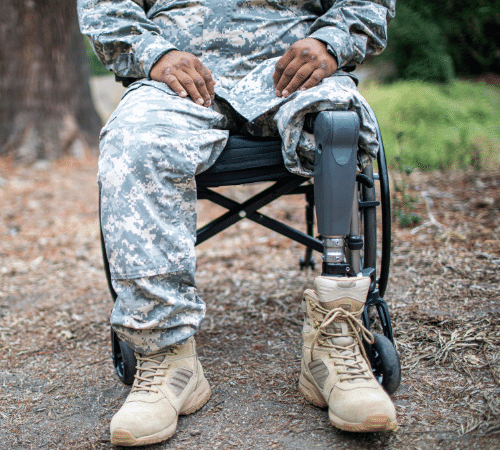Equipping yourself with an understanding of what the VA wants to see in your veterans disability claim can help make the appeals process smoother.
Summary
- VA disability benefits are available for veterans with service-connected disabilities, including conditions caused or worsened by military service.
- Three main types of VA claims exist: in-service, pre-service for aggravated conditions, and post-service for conditions that appeared after service.
- National Guard and Reserve members may qualify for VA benefits but face additional eligibility criteria.
- Common disabilities include chronic back pain, PTSD, and hearing loss.
- An experienced VA disability attorney can assist with appealing claims for benefits.
You proudly served your country with honor and bravery. However, you are now dealing with the aftermath of your service. You are one of many honorable veterans who are living with a service-related disability.
As a disabled veteran, you may be entitled to receive disability benefits from the VA. However, gathering evidence of eligibility, understanding how current VA regulations apply to your case, and simultaneously coping with your symptoms can be a significant challenge.
At VetLaw, we aim to relieve veterans of the burden of facing a VA benefits denial on their own. Our veteran disability claims lawyers possess the expertise and skills needed to successfully appeal for VA disability compensation.
Call us at (855) 586-1022 or fill out a contact form to set up a free consultation with one of our VA disability benefits attorneys. We will provide clarity on what the VA requires to approve veterans disability benefits for your service-connected illness or injury.
In the meantime, you can read on to learn more about the VA disability eligibility requirements and the benefits process.
What are VA Disability Benefits?
VA disability benefits are provided through the U.S. Department of Veterans Affairs (VA) to former members of the United States Armed Forces. However, not all disabled veterans are eligible to receive the veterans’ disability benefits provided by the VA.
Disabled veterans who are deemed eligible to receive VA benefits will be sent a monthly monetary payment from the U.S. government. Not all veterans who are eligible for VA disability benefits receive the same monthly monetary compensation.
The main factor that affects the monetary amount of the payment is the veteran’s degree of disability.
Having a higher degree of disability will result in receiving a higher monthly payment. Disabled veterans whose disabilities require travel for rehabilitation or treatment may also be eligible to receive an additional monthly payment for travel-related expenses.
The three main VA disability benefits claims are as follows.
- In-service Disability Claim: You got sick or became injured while serving in the military
- Pre-service Disability Claim: You had a pre-existing illness or injury before joining the military that was made worse by serving.
- Post-service Disability Claim: You have a disability-related to your active-duty service that did not appear until after your service had already ended.
What Qualifies For VA Disability?
Who is Eligible to Receive VA Disability Benefits?
To receive VA disability benefits, there are certain requirements that must be met. The major eligibility requirement for VA disability benefits is that you incurred an illness or injury that was caused by or was made worse by your active military service. Further eligibility requirements are listed below.
To receive VA disability benefits, both of these must be true.
- You served on active duty, active duty for training, or inactive duty training.
- You have a disability rating for your service-connected condition.
To receive VA disability benefits, one of the following must also be true.
- You got sick or became injured while serving in the military.
- You had an illness or injury before joining the military that was made worse by serving.
- You have a disability-related to your active-duty service that did not appear until after your service had already ended.
Former service members who did not receive honorable discharge are most likely not eligible for VA disability benefits. Veterans whose disease or disability was caused by misconduct or occurred while the veteran was avoiding duty are also unlikely to be eligible for VA disability benefits.
However, it is always best to contact a qualified VA attorney to better understand your rights and eligibility.
What Conditions are Covered by VA Benefits?
There are a variety of conditions that are covered by VA disability benefits. The following are common conditions that are typically covered by the VA.
- Chronic back pain or a diagnosed back disability
- Severe hearing loss
- Scar tissue
- Range of motion loss
- Ulcers
- Cancers caused by exposure to toxic chemicals
- Breathing problems or lung disease
- Traumatic brain injury (TBI)
- Posttraumatic stress disorder (PTSD)
- Depression
- Anxiety
Typically, the easiest disabilities to claim for VA benefits are those that impact a significant number of veterans and have a well-documented or obvious connection to military service, such as hearing loss from working in loud environments.
In addition to these common service-connected disabilities, veterans can seek VA disability benefits for secondary conditions that are created or aggravated by a health issue that is directly tied to their military service.
Common examples of secondary conditions include mental health conditions like PTSD and depression. Veterans may also develop as physical conditions like GERD, chronic pain, and gastrointestinal issues secondary to their original condition.
What is the Process of Applying for VA Disability Benefits?
If you believe you have eligibility to receive VA disability benefits, the first step is to submit a VA disability claim. It is best to submit your claim as early as possible. Preferably, that means within one year of your separation from the military.
Submitting a claim after being out of military service for over a year is possible. However, waiting to submit a claim until after the one-year mark will make it harder to provide evidence that your disability is definitely service-connected.
To maximize your chance of receiving VA disability benefits, it’s essential that you carefully prepare for the VA disability process. The process can be challenging to navigate alone. Therefore, it’s in your best interest to contact an experienced VA disability attorney to help you navigate this process seamlessly.
Consult with an Experienced Veterans Disability Attorney Today
Your service to the United States of America is greatly appreciated. However, you know better than anyone that service to your country doesn’t always come without a cost. If you received a disability during your service or had an existing disability that was made worse by your time in the service, you deserve compensation for your sacrifices.
Navigating the VA disability benefits application can be difficult alone. For help with a VA disability denial or appeal or to have any of your questions answered regarding VA disability benefits, contact an experienced VA disability attorney today.
You can reach us at (855) 586-1022 or fill out a contact form to schedule a free consultation. We will help you understand where your previously denied claim fell short. Additionally, our team can offer solutions to rectify those issues in an appeal.







